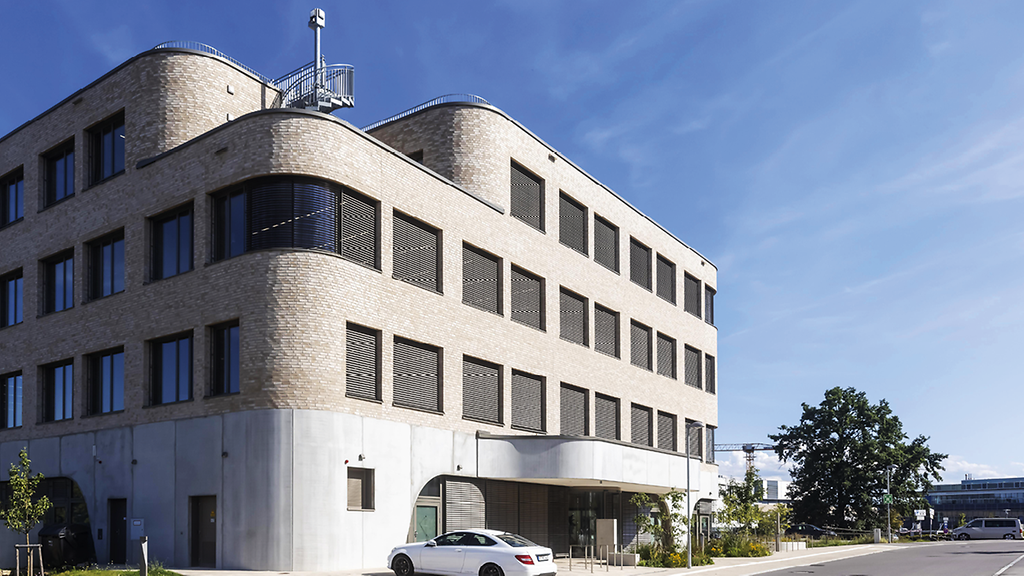
Markets Germany Magazine 1/25 | Technology
A Beacon for AI
In Cyber Valley in southwest Germany, international companies are working closely together with the research community to develop artificial intelligence and robotics for innovative applications. The location is a magnet for industry leaders looking to benefit from the German spirit of invention.
Apr 10, 2025
Europe’s largest private AI laboratory is run by a Finnish company called Silo AI and is currently developing two big projects in southwest Germany. The Finns have been working with the University of Stuttgart and the University of Freiburg for several years, with the joint goal of creating a large language model (LLM) to compete with ChatGPT.

This article was published in issue 1-2025 of the Markets Germany Magazine. Read more articles of this issue here
The LLM in question will be openly accessible and will work in all official European Union languages, in contrast to OpenAI’s ChatGPT, which has been trained mainly on English-language data. To achieve this, Silo is developing open-source AI models that not only work better with European languages, but also meet strict privacy, security and ethical standards.
It’s no coincidence that Silo AI is active in the southwest of Germany — one of the most innovative and economically robust regions in all of Europe. Collaborations like these are not uncommon in “Cyber Valley,” Europe’s largest center for AI and robotics. There you’ll find numerous examples of research institutions pooling their expertise with big international players like Bosch, the Mercedes-Benz Group and Amazon.
“A unique ecosystem for AI and robotics has emerged in the region, which enjoys an international reputation,” says GTAI’s digital and services industry expert Asha-Maria Sharma.
With its German- and English-speaking communities, Cyber Valley is home to many highly specialized experts and well-connected investors, and companies can easily find talented partners among the many research institutes clustered there.
The Bottom Line
Cyber Valley in southwest Germany is a leading global location for AI and robotics. It combines research, industry and a strong start-up ecosystem, offering international companies unique growth and networking opportunities.
Bundled AI expertise
The Karlsruhe Institute of Technology (KIT) is a world-leading example of cutting-edge research in Cyber Valley. For instance, Tamim Asfour, Professor at the Institute for Anthropomatics and Robotics at KIT, has more than 25 years of experience in the field. KIT researchers develop learning and collaborating humanoid robots capable of providing support to humans across different domains — from domestic assistance and caregiving to performing tasks in hazardous environment.
“Being part of Cyber Valley allows us to collaborate with the thriving network and vibrant ecosystem of AI and machine learning pioneers,” says Asfour.
New discoveries from research in Cyber Valley will be transferred directly to industry. To date, more than 70 start-ups have emerged from the Cyber Valley Start-up Network, supported by a strong investor environment, the AI Incubator mentoring program and money from the Cyber Valley Research Fund. Bosch, for example, registered the most AI patents in the world last year — another indicator of the innovative strength of the region.
Cyber Valley continues to attract other institutions and companies that want to profit from the area’s concentrated expertise. For example, the European Laboratory for Learning and Intelligent Systems (ELLIS) opened its first location in Tübingen last summer. ELLIS seeks to advance basic research in machine learning (ML) and transfer it to applications in areas such as medicine and mobility. The new institute will make the region even more attractive for companies who want to benefit from the latest scientific and technological findings to enhance their products and services.
Open doors
The German state of Baden-Wuerttemberg and the Max Planck Society founded a Cyber Valley Office in 2022 to facilitate cooperation between the private and academic sectors. Its director, Florian Mayer, sees himself as a service provider for the valley’s players.
“We arrange contacts between research institutions and companies, increase public visibility and answer administrative and legal questions, for example about the European Union’s AI law,” says Mayer.
GTAI also supports international companies in establishing contacts with players in Cyber Valley, for example by organizing delegation trips. Mayer says interest from international companies in Cyber Valley has seen a significant increase recently. This augurs well for the southwest region in enhancing its status the most important AI and robotics location in Europe.
FDI perspective: AI research in Germany
US giant Amazon has opened its first science hub outside the US in Cyber Valley in cooperation with the Max Planck Society.
AI innovations are not exclusive to Silicon Valley: They also come from Tübingen in southwest Germany. Amazon opened its first science hub outside the US there in 2022 and is now collaborating with the Max Planck Society and universities in the Stuttgart-Tübingen region. “The research community in Tübingen, with its talented experts, plays a key role in our success,” says Michael Hirsch, Amazon’s site manager in Tübingen. “We are delighted to be part of it.”
As well as supporting research projects, Amazon is also funding the education and training of talented PhD students. Scientists from the Max Planck Society also have the opportunity to gain insights into research issues by working part-time at the US tech giant. The results of groundbreaking projects, such as algorithms for causal machine learning, are published by the scientists both in scientific publications and through open-source software.
Amazon’s research focuses on technologies such as object-centered learning and environmental perception, which are already used by millions of its customers. For example, the mixed research team has produced software that enables virtual fitting of shoes and sunglasses: Customers can use the app to see how a pair of shoes or sunglasses will look on them from every angle to make better purchasing decisions.
